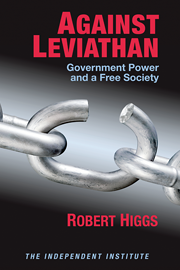In public statements, President George W. Bush has often avowed his personal religious faith, and from the very beginning of his administration, he has sought to draw churches and other religious organizations into the orbit of the government’s provision of goods and services—thus, the so-called faith-based initiatives. Bush insists that such religious providers have an excellent record in helping drug addicts and others who have gone astray to get their lives back on track. Although the president has yet to announce formally that his foreign policy also relies heavily on faith, this reality has become increasingly clear as his term in office has unfolded.
When the administration released its “National Security Strategy of the United States of America” to Congress last summer, the grandiosity of the intentions expressed in the document stunned many observers—as Mises Institute historian Joseph Stromberg noted, “it must be read to be believed.” The strategy amounts to an enormously presumptuous agenda for domination of the entire world, not only overweening in the vast scope of the specific ambitions enumerated but also brazen in the implicit assumption that the president of the United States and his lieutenants are morally entitled to run the planet. It takes a lot of faith in one’s own rectitude to declare, among other things, that “our best defense is a good offense” (I am not making this up, it’s in the document). Small wonder that George Bush closes his introduction to the document by resorting to religious metaphor, referring to his foreign policy as “this great mission.”
Well might we recall, however, that the crusaders of old went forth on their faith-inspired missions heavily armed and itching for a fight, and in those respects the Bush administration bears a startling resemblance to them. “As a matter of common sense and self-defense, America will act against . . . emerging threats before they are fully formed,” the president declares. In disturbingly Orwellian rhetoric, he affirms that “the only path to peace and security is the path of action”—the path, that is, of launching unprovoked military attacks on other countries. This ongoing preemption, supported by the administration’s faith that it can identify the threats correctly even before they blossom, will be, the president warns, “a global enterprise of uncertain duration.” We may presume that once Eurasia has been preemptively polished off, the United States will set its military sights on Eastasia.
The adminstration’s faith in preemptive warfare currently expresses itself in the plan for military conquest of Iraq, a country that has not threatened the United States and does not possess the means to do so effectively in any event (in part because the United States has been waging low-level warfare and enforcing an economic embargo against it for some twelve years). The Cheney-Rumsfeld-Wolfowitz-Perle coterie evidently has faith that the United States can conquer Iraq quickly and then turn it into a showcase of stable, flourishing democracy. The sheer preposterousness of this expectation suggests that it is fueled more by quasi-religious zealotry than by logic and evidence. Whatever else Iraq may be, it certainly is not a democratic success story waiting to be told by American crusaders. Indeed, given the violent ethnic, religious, and political conflicts that ravage this unfortunate country, it may not be viable under any form of government except dictatorship—nothing in its history suggests otherwise.
Nonetheless, President Bush, after having insisted not so long ago that he opposed getting our country bogged down in utopian “nation building,” now has unleashed the neoconservative fanatics to transform the Middle East into a fantastical form they find pleasing, molding Iraq itself into something remarkably like the placid social democracies of North America and Western Europe. If you suspect that the Iraqis lack the necessary parts to compose this visionary contraption, well, you just need to have faith. As St. Paul wrote to the Hebrews (11:1), “faith is the substance of things hoped for, the evidence of things not seen”—a characterization that fits perfectly the administration’s vertiginous conception of the post-conquest reconstruction of Iraq.
Finally, the Bush administration has faith that it can continue to drag the American people down the path of perpetual war for perpetual peace and endless nation-building. Maybe it can: for the most part, the people certainly have rolled over and played patsy so far, especially if we judge by the actions of their pusillanimous representatives in Congress, who hastened to pass a resolution unconstitutionally delegating to the president their power to declare war against Iraq.
In the past, however, the American public has risen up from time to time to insist with regard to some disastrous foreign adventure that enough is enough. They eventually did so during the Korean War, and they did so again during the Vietnam War. Unfortunately, in both instances the public came to its senses only after enormous loss of life and other human and material devastation had been sustained. More recently, with respect to the U.S. military mission to Somalia, the public quickly decided against spilling additional blood in a seemingly hopeless nation-building effort.
I would like to believe that sooner or later the American people will resist, and resist strongly, the Bush administration’s crusade for global domination in general and its present plan to conquer and reconstruct Iraq in particular. As matters now stand, though, I just don’t have much faith in the majority of my fellow citizens.
George Bush’s Faith-Based Foreign Policy
Robert Higgs is Retired Senior Fellow in Political Economy, Founding Editor and former Editor at Large of The Independent Review.
AfghanistanCulture and SocietyDefense and Foreign PolicyIraqPhilosophy and ReligionTerrorism and Homeland Security
Comments
Before posting, please read our Comment Policy.



















